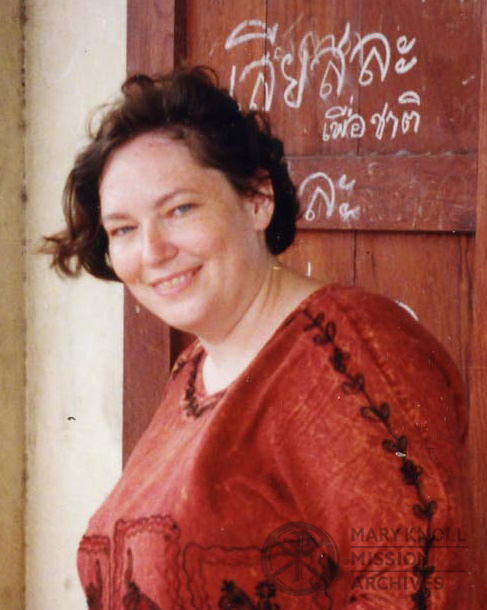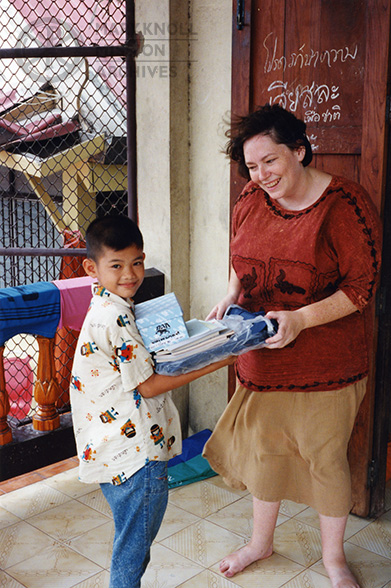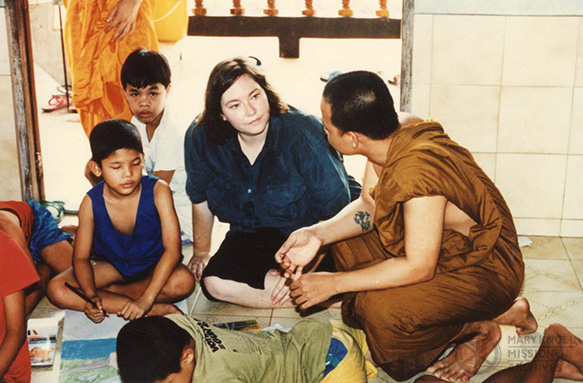“Most of us long for a kind of connectedness we rarely find…”
“But when faced with the opportunity…we shrink from the very engagement we desire and have come so far to find.”
I am currently reading Singing to the Dead: A Missioner’s Life among Refugees from Burma by former Maryknoll Lay Missioner Victoria Armour-Hileman.
“Singing is the story of Vicki’s two-year service as an intermediary for the Mon Buddhist monks of Bangkok, Thailand. Within the confines of their temple, these Burmese monks, illegal residents themselves, offer refuge to their fellow country men and women, victims of civil war, forced to flee their homeland, these people have suffered greatly. Many have been tortured and wounded and are suffering from illnesses both physical and emotional.
They need help far beyond the limited resources of the temple. Vicki, a Maryknoll lay missioner since 1988, takes on the role of “go-between”, becoming the link between the monks and the international aid agencies in Bangkok. Her encounters bring spiritual, emotional and physical connectedness, and with it the pain and sorrow of these people’s lives.” [Excercpt from article “Singing to the Dead,” Lay Missioners Victoria Armour-Hileman’s book is nominated for prestigious literary award,” http://www.maryknoll.org/MARYKNOLL/MMAF/mf_vicki_award.htm*, October 2002]
The refugees have experienced so much pain, cruelty, and neglect, which Vicki is exposed to on a daily basis as she walks through the Buddhist wat, hearing many of their stories and seeing their conditions. It seems as though it is a continuous stream to intake and fathom while the amount one can do is nowhere comparable to the amount that needs to be done, in a place where getting something done is by no stretch a simple path. She, however, is not the only one overwhelmed, unsure, and operating in fear. Fear for those that taking action might hurt, fear for those who may be punished for helping, fear that the action which puts everyone at risk might not work, fear for those who may suffer if action isn’t taken. Fear that sometimes causes one to look away or freezes us into inaction. I wanted to share a moment where Vicki zeros in and poignantly reflects upon this:
“I think of all of us: the Thai government, police, hospitals, volunteers like myself. We all have our ways of not listening, of turning away. The police rush in on men so terrified they throw themselves off the roof and land wounded among old graves, where the police then leave them, too busy to be bothered or too ashamed to ask forgiveness. Doctors turn the wounded away and don’t even read the papers to understand the situation that is driving people across the border.
And me, I am implicated, too. I get busy, so I won’t have to hear the stories of people I have ostensibly come to serve. A man tells me he has been tortured, and I say, Excuse me, I need to pay a bill or call a cab or get a prescription. I walk away, and though part of my heart wants to say, ‘Tell me your story,’ another part wants to say, ‘Be silent. I’m too afraid to listen.’
Perhaps this will give us the perspective to look at these situations and have the courage to take that moment to reach out. Let us listen and make those connections. They will not all be easy but from them, through whatever trials, can come great joy. In fact, as Vicki reaches out, experiences setbacks, continues to try to find ways to help, she experiences moments of success:
“It’s like the final scene of It’s a Wonderful Life. We have each brought our pocketful of change, knowing if Theresa [one of Vicki’s collaborators] has asked it of us, then it is really needed[…] Together we have raised enough to allow us to squeak through. She smiles and uncharacteristically hugs me. Twice.
Outside again in the bright light, prisoners’ faces drift through my mind. The anxious eyes, the fingers just touching through the bars. Free, free, all free.”
Here Vicki and others were able to facilitate the release of 27 prisoners kept well beyond their prison sentences and arrange transportation for those who needed to travel to the northern border. It was a struggle to get there and even at the last minute after funding dropped out they were able to cobble together the funds and still make it happen. It is a triumph. In this moment, Vicki allows herself “the luxury of being philosophical” (p.135) and shares with the reader something I think we all need to remember to do:
“[…] But I will not think of all that today. My life is only one. So I rejoice in my successes. Today is enough for me. Today I will not think of those refugees snared by the police and waiting for their sentences. I will not think about the fact that I don’t know the end of the story for those refugees who were released.
[…] [W]e can only do what we can do. And even that we don’t do alone. We play a small part in any endeavor, and for what happens we cannot entirely claim either the credit or the blame. So tonight I will not think of my possible failures, of all that I do not know, or of how little difference my successes make in the grand scheme of things.
I will think instead of the long line of detainees handing in their yellow prison cards and boarding a dusty bus for the border.” (p. 136)
Life is not something that will ever be easy. It will ebb and flow into tough and easier times and something will inevitably always be happening. It is important, especially in the harder times, to allow yourself these little moments to celebrate your successes. Though they may not be earth shattering, they matter and what you did mattered. A wise reminder from Vicki to all of us.
*The website location in the extracted text no longer exists




